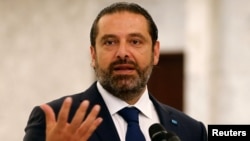Lebanese Prime Minister-designate Saad al-Hariri looked closer to forming a new national unity government as a major Christian party declared on Monday it would take part despite being offered an "unjust" share of cabinet seats.
Hariri has been trying to form the new government since a May parliamentary election, with rivalry between the Lebanese Forces (LF) and President Michel Aoun's Free Patriotic Movement (FPM) - both Christian groups - seen as the main obstacle.
The delay has held up economic reforms that have been put off for years but are now seen as more pressing than ever.
Lebanon is wrestling with the world's third largest public debt-to-GDP ratio, stagnant growth and what the International Monetary Fund (IMF) has said are increasing vulnerabilities within its financial system.
LF leader Samir Geagea said the ministerial portfolios offered to his party represented a "very big injustice" when compared with the size of its enlarged parliamentary bloc and the ministries offered to other groups.
But the LF had nevertheless decided to take part "to continue to work from inside the government to achieve our goals," he told a news conference.
A government formed on this basis would be seen as a political victory for Aoun, an ally of the Iran-backed Shi'ite group Hezbollah, over his old adversary Geagea, Hezbollah's most prominent opponent in Lebanon.
The election produced a parliament tilted in favor of Hezbollah. Together, Hezbollah and its political allies secured more than 70 of the 128 seats. The group is proscribed as a terrorist movement by the United States.
The LF nearly doubled its number of MPs, winning 15 seats.
Government posts in Lebanon are filled according to a strict sectarian system: the president must be a Maronite Christian, the prime minister a Sunni Muslim and the speaker of parliament a Shi'ite Muslim. Posts in the cabinet of 30 ministers must be split equally between Christian and Muslims.
Hezbollah Demands
Hezbollah is expected to take control of the health ministry, the most significant cabinet post it has held, and to increase its number of ministers to three from two in the outgoing cabinet.
The group also wants to see one of its Sunni allies installed as a minister in the new government of 30 ministers, two senior officials familiar with the matter said.
Hariri, Lebanon's main Sunni politician, has so far resisted this demand. He lost more than one third of his seats in the election, several to Sunni allies of Hezbollah and its regional allies Syria and Iran.
One of the officials said the Sunni issue may hold up a final agreement but would not derail it. A second political source familiar with Hezbollah's demands said there would be no government unless one of its Sunni allies became a minister.
Hezbollah hopes the formation will be soon.
"We are in the last phase and the period of serious anticipation," Mohammad Raad, a leading member of the group, said in televised remarks.





